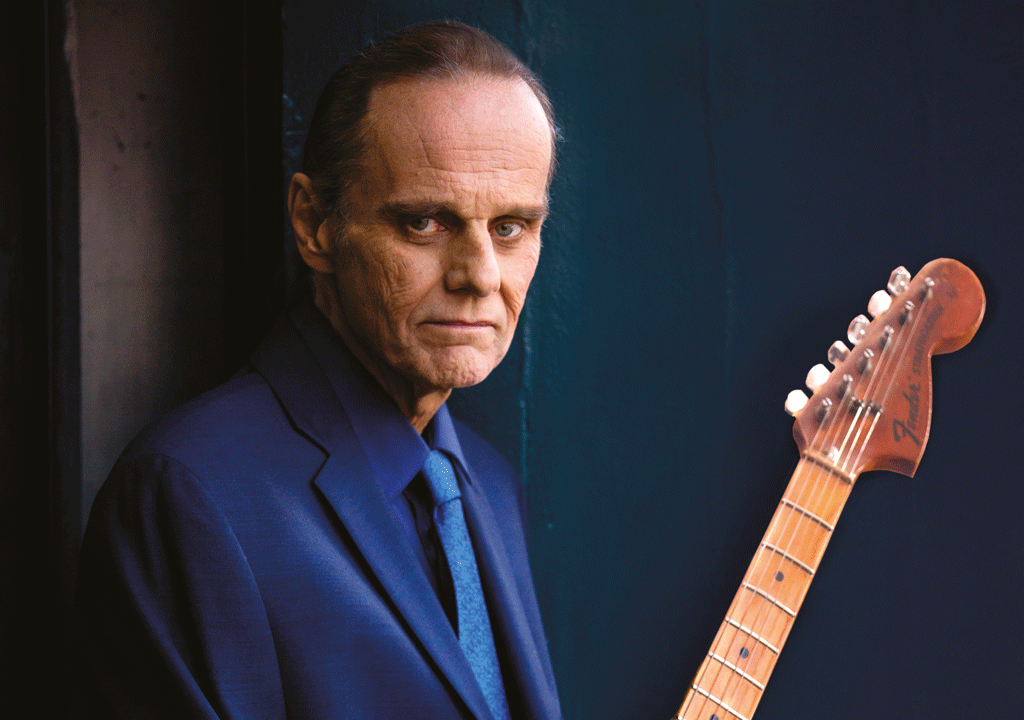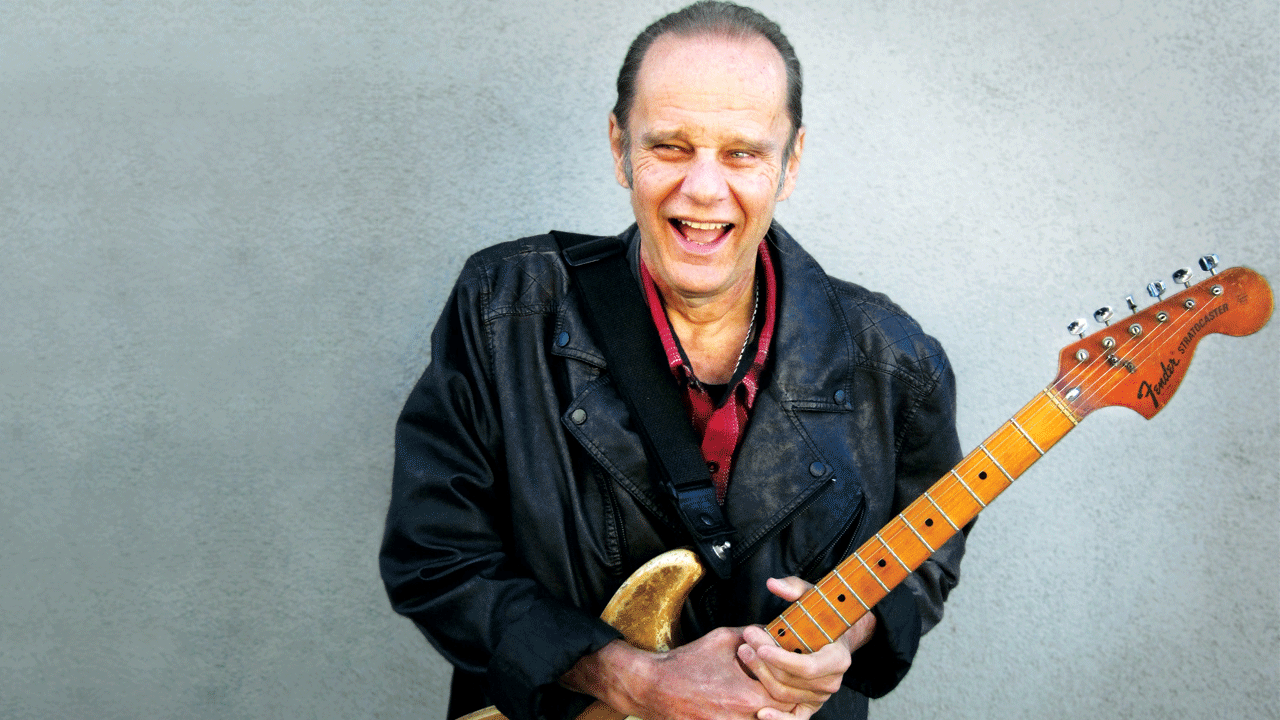Now, blues-rock’s greatest escapologist is back to (very) rude health and preparing for a world tour that promises to blow the doors off. “My God,” he tells The Blues, “I was so far gone…”
Launch Skype. Make video call. Take a deep breath. One year ago, during the final, agonising interviews for Walter Trout’s official biography, this was the daily routine. By then, I had learnt to be braced for the face that would greet me down the webcam from Los Angeles. Gaunt. Grim. Sallow. Sunken. A skeleton in spectacles. A man expecting to die.
What a difference a year makes. “I gotta tell you,” booms Trout, a glorious grin spreading across his meaty chops. “This liver thing. Not only is it a great weight loss programme, because you can lose 120 pounds in six months. It also regrows your hair. All the places I was going bald, my hair is growing back. So if you got a guy who wants to cure male pattern baldness, all he needs is a liver transplant. It’s only two million dollars. No problem.”/o:p
“I call him Benjamin Button,” laughs the bluesman’s wife and manager Marie, likewise transformed from the harried figure who battled every step of the way to last May’s life-saving liver transplant. “He’s ageing in reverse. His hair is growing back. The wrinkles are smoothing out.”
Having lived vicariously through those dark days, peering into the desperation of Trout’s family home, it should be enough for me to see the bluesman restored to health. Like the rest of us, though, I’ve been holding out for the Hollywood ending: the moment when he walks from the wings to a thunderclap of applause and flays that knackered Strat once again. Trout feels the same. “Oh, fuck, yeah. It’s been a year and a half. This is the longest I’ve gone without playing for people. I used to freak out if I had a month off./o:p
“I’m a homebody,” he says of his day-to-day existence. “The kids go to bed, then we lay on the couch, I’ll give Marie a foot massage, we go to bed and pass out. It’s like being an old married couple. We’ve been out to a few movies lately. While We’re Young with Ben Stiller: don’t bother. It’s shit.”
Domestic bliss doesn’t suit Trout, but he’ll have his leash unclipped soon enough. A few weeks after we speak, the guitarist will return to action at the Albert Hall’s Lead Belly Fest. From there, his bus crosses the States over the summer and hits Europe in November (by which time he may even be armed with a new album). Appropriately, the tour tagline is I’m Back. Trout breaks into a Schwarzenegger impression: “I should have called it I’ll Be Back.”
This isn’t Trout’s first comeback. If you’ve read Rescued From Reality, you’ll appreciate that the New Jersey bluesman has made his name as a great escape artist, evading the tyranny of a troubled stepfather, outrunning heroin addiction and alcoholism, even managing to commit career hara-kiri by quitting John Mayall’s Bluesbreakers, then bouncing back with a triumphant solo career. If a cat has nine lives, then a Trout has even more./o:p

Above: Trout in 2014, as his illness threatened his life.
Even so, you feared the guitarist had used them all up when he was struck by liver cirrhosis and hepatitis C in June 2013. By then, Trout and I had been working on Rescued From Reality for several months, and the project that began as a joyful account of swashbuckling derring-do suddenly felt like an epitaph. Having completed the book, our final interview was a cover story for issue 13 of The Blues. As we hung up, I told Trout that he’d make it, but it was hard to keep a valedictory note out of my voice.
“I was not too bad when we did those interviews,” he reflects. “It was after I moved to Nebraska that I really got sick. I was bleeding out of my rear end and they couldn’t stop it. The blood they give you is frozen, right, and they had hairdryers going so they could put it into me quicker. When they finally stopped it, I went into a coma. I was completely out. When I came to, I had brain damage, couldn’t speak English, didn’t know who anybody was. And they didn’t know if that was going to be permanent.”
Trout shakes his head. “My wife showed me some photos of me, taken a year ago. It’s hard for me to believe that I’m still here, and I don’t take it for granted for one minute. I had a week to live when they got me that liver. I’m actually going to be an advocate for [organ donation]. I’ll be talking about it from the stage. You don’t need your organs when you’re gone. You’re either gonna get buried, and they’re gonna rot. Or you’re gonna get cremated, and they’ll burn up. You have the ability to save a life. And it’s not just livers they can use, it’s kidneys, tendons, corneas. Why not do it, man? It’s incredibly important – and I’m walking testimony.”
If somebody up there evidently likes Walter Trout, the outpouring of goodwill and online donations last year confirmed he’s pretty popular down here, too. “It was incredible,” he says. “I mean, the financial help was amazing, because like I say, we had a hospital bill of two million dollars. This is in the States, right? We don’t have national healthcare. You have to get private insurance. So we had to pay part of that – not all, thank God – and that fundraiser saved us.
“But it was also the well-wishes, and the prayers and thoughts. Marie would come in every day, as I lay there in the hospital dying, sit next to the bed and read me these messages. It kept me going.”
Trout is quick to squash the notion that it’s all grapes and Lucozade after a liver transplant. “Maybe I shouldn’t say this for people who are facing it,” he murmurs. “But the hype is that after you get the transplant, you wake up and you’re a new man. I got much worse. I started leaking bile into my abdomen, and my organs started burning up and digesting themselves. My blood pressure was 60⁄30. I was close to death. They wouldn’t give me any pain medication. And I lay there for days, screaming at the top of my lungs.
“I remember saying to Marie, ‘I feel like dying. This hurts too bad. I’m in excruciating pain, all the time. If this is what life is like after a transplant, I’m ready to go.’ And she would tell me, ‘No, you have to fight. Come on.’”
At last, following three operations in nine days, Trout began rebuilding the body he addressed so starkly on 2014’s Wastin’ Away. “They put me in a physical rehabilitation facility in Omaha,” he explains. “First, these therapists would get me walking on a Zimmer frame, then with a cane. Then they forced me to walk without either. They’d hold me up, and if I could do 20 feet, everybody would celebrate. I was in there for five weeks, and for three hours a day they were busting my ass. If I said, ‘Well, I don’t feel like it today’, they’d be like, ‘No, get the fuck out of bed, now.’”
Worse than the physical pain was the identity crisis. When I last spoke to Trout, for an update in issue 15, he had just been handed a guitar for the first time. It hadn’t gone well. “My son brought a Stratocaster in,” he recalls, “and he said, ‘Dad, you have to keep in touch with who you are.’ They moved me into a chair, and I could not press the string to the fret. I just broke down. I gave the guitar back to my son and said, ‘I can’t do this, take it away.’/o:p

Above: onstage in 2013.
“When I was in hospital, I’d also lay in bed and go on YouTube and watch videos of myself. And I could not relate to the guy in the videos. Like, ‘Who is that person? Is that really me? Did I really do that? I can’t do that…’”
Upon returning home, Trout holed up in the garage, determined to reclaim those eye-popping chops. “I remembered how to do it in my brain,” he notes. “But my muscles, arms, tendons and fingers – to make them do it again was incredibly difficult. I picked up the guitar and it was some of the worst pain I’d felt. I didn’t have calluses, so my fingers were opening up and blood was squirting out and shit.
“But I just kept working at it. I sat there for hours, weeks and months – and it came back. I actually think I’m playing better than I have in a long time, because I don’t get the arm cramps and all that shit. The weakest part is still my legs. When I rehearse with the band, I’ll stand for maybe 45 minutes. It remains to be seen if I can do a 90-minute show and not sit down for a while.
“As for my voice,” he adds, “it’s doing good. It’s taking a long time, because I had ventilator hoses down my throat, and a feeding hose in my nose. I didn’t have one bite of solid food in four months. They were giving me nutrients through my nose, and all this went down through my throat, and my voice was hurt by it. Now, I’m singing, but it’s back to this kind of choirboy voice that I had when I was 20 years old. The rasp I developed by singing hard every night for 35 years is gone. But it’s better than on The Blues Came Callin’. Because I had almost no voice there, y’know?”
Trout’s progress became deafeningly clear on New Year’s Eve 2014. “That was my first time playing guitar in front of people again,” he recalls. “What we do every New Year is, we move the cars and set up a band in the driveway. We pull one car onto the edge of the driveway, up on the slant, and we turn the headlights on: that’s our stage lights. And my kids and I go out and rock as loud as we can. I turn my amp up twice as loud as I would at Shepherd’s Bush. You can hear us 10 blocks away. At the stroke of midnight, we do Auld Lang Syne, then we do classic rock songs till the cops come. This year, we did Born To Be Wild and Fortunate Son, and we got about 50 of the neighbours out there, dancing in the street, applauding and freaking out.”
Just as we will when the Trout band reaches British shores, I remind him. Trout buries his face in his palm, overwhelmed even by the thought of returning to stage-time. “Oh boy, of course, I’m incredibly excited,” he says. “But I’m still apprehensive, like, ‘Am I gonna be able to do this?’ I know I can do it. But there’s still that nagging thing when I think how weak I was. My God, I was so far gone. But I get the feeling that all I’ll have to do is show up and wave and say, ‘Yes, I’m still alive.’ And the fact I can still play will be a bonus.
“My shows always used to be emotional rollercoasters, and I think this tour might be even more emotional. I’m gonna have a hard time every night. I know that I’m just gonna walk out on stage and I’m not gonna be able to deal with it. Y’know, I’ll just want to get on the mic and weep for 20 minutes, then run through the crowd and give everybody a hug.”
The hearty face on the webcam gives another smile at the prospect. I can’t help reciprocating. It’s good to have Walter Trout back. “Y’know,” he concludes, “things are incredible. The things that used to annoy me, they just roll over me like water over a duck now. I just can’t be bothered with bullshit. I have another chance. I have stared death in the face, and it makes you appreciate being here so much more. If you’d told me a year ago that I’d be up and playing my ass off, I’d never have believed you.”/o:p
Walter Trout tours the US and Canada from July, with the European leg starting in November. See www.waltertrout.com for details./o:p
Comeback Special
Trout on his work-in-progress next album…
“I’ve kind of gone through a creative renaissance. I started playing again, and I could sit down without any trouble at all and write maybe two songs a day. I wrote six in one day. It just comes out.
“The new material is rather dark. I basically would sit down and say, ‘Okay, put yourself back in the position where you’re in Nebraska laying on your back. Your stomach is swelled up like a beach ball, you have a ventilator tube down your throat and IVs in your arms. It’s three in the morning, you can’t sleep because they keep coming in and taking blood every hour. What did that feel like? Also, what did that sound like?’
“So this shit is coming out. It’s pretty graphic. Y’know, there’s a chorus on one called Omaha that goes, ‘The sheet has a stain, I need something for the pain, but I don’t want to get strung-out again, I’m down in Omaha’. I have one called Haunted By The Night that goes, ‘Bring me water, wash me down, open the curtain, let me see the lights of town. I get the feeling the devil’s on the loose, he’s laughing in my face, he’s handing me a noose. He’s holding up his fists, but I’m too tired to fight. I’m flat on my back and I’m haunted by the night.’ On that one, I’m trying to make the guitar sound very spooky.
“The album is about what I went through. Right now, I have something to say. I need to get it out, y’know?”/o:p

